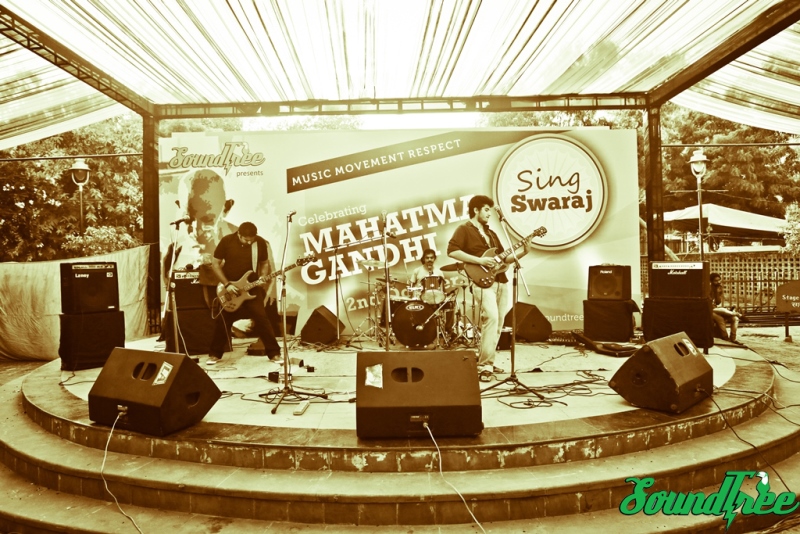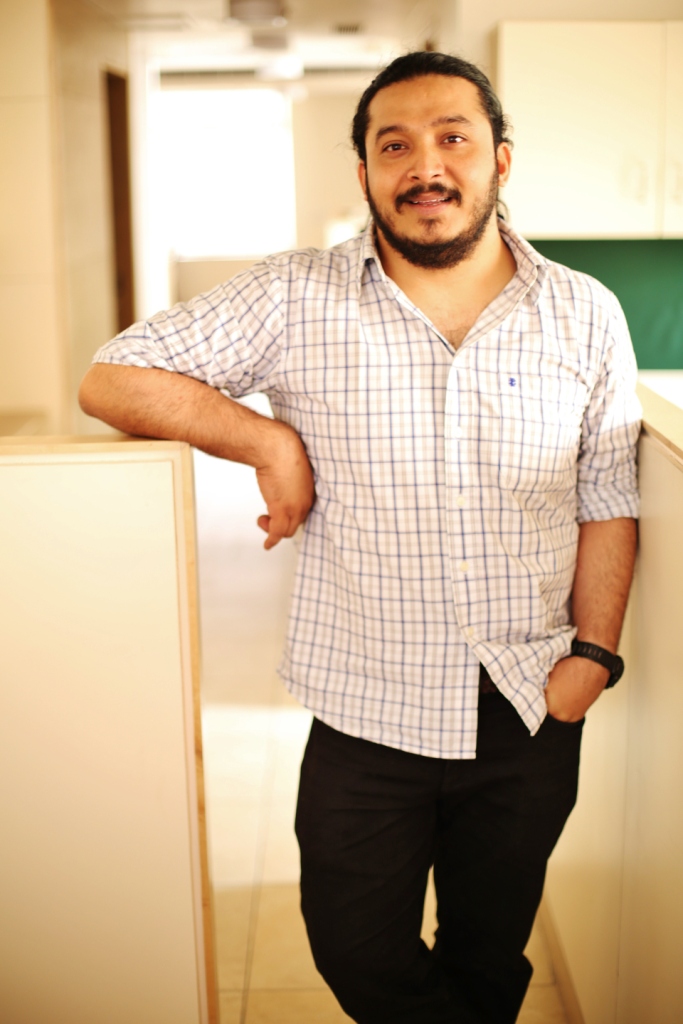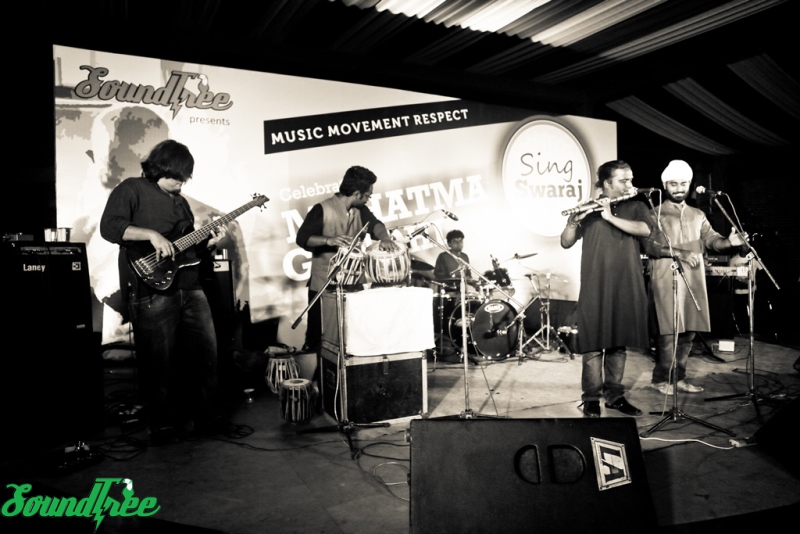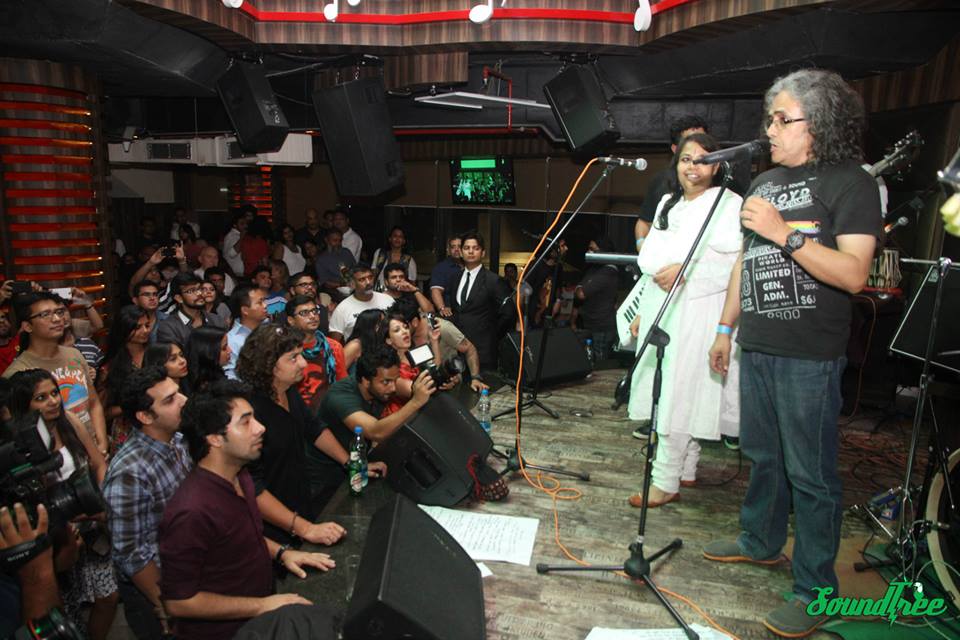The man behind Sound Tree Media, Ashutosh Bhattacharya opens out to Amrutha Ananth of Eight Octaves about the initiative, how it has grown and what they intend to do in the future.
Eight Octaves: You brought in a French touch to India by celebrating World Music Day (tracing its origins to Fete de la Musique) at the capital city this year. How easy or difficult was it to bring together various big names together. Tell us how it all happened.
Ashutosh: Fête de la Musique or World Music Day as it’s popularly known has become an international phenomenon today. It was only inevitable that this festival that first started in France almost thirty years ago was embraced by the world considering how important role music plays in our lives. We at SoundTree have a vision to create a thriving alternate cultural ecosystem in India; hence for this day we thought that the idea of seeing key Indian musicians coming together to collaborate and perform would be the ultimate expression of the celebration of music. We intend to make it bigger in the times to come and who knows we might take the Indian talent to global audiences in the next edition.
The idea behind this event was to celebrate independent music and to bring together multiple genres. The World Music Day was the perfect opportunity to create a musical extravaganza for music lovers. We wanted to present an exhilarating music experience infused with the inimitable talents of the top musicians. I want to summarize by saying that it was all about collaboration for a common cause and the cause was music. I am confident SoundTree World Music Day 2014 will see a lot more action.
Eight Octaves: How do you see Indian music scene positioned on a global scale, both in terms of Classical music scene and emerging western trend in the country?
Ashutosh: There is a lot happening in the Indian indie music scene. The biggest change for the indie music scene has been the tremendous growth in the number of concerts/festivals and venues. People today are willing to experiment with new genres of music and have many choices besides international artists. But the sad part is the lack of recognition that Indie artists are still facing. Some brilliant musicians are trying to make their mark out there, but their voices are getting lost. We at SoundTree intend to work as a channel to create an environment where it is a win-win situation where the talent gets its respect and long due recognition and the industry sees this sector as a booming business prospect. I would definitely like to add that talent and music would always be supreme.
Eight Octaves: How did the idea of SoundTree Media crop up? How do you usually plan promotional strategies for artists who approach you?
Ashutosh: SoundTree Media has been founded with a clear objective to promote Indian independent music. India possesses a rich culture and talent here is abound, which is unexplored and awaiting its due recognition nationally and globally. This is where SoundTree comes into picture, to develop strong partnerships and create an ecosystem where alternative independent music is respected and recognized. For us an individual artist or band needs to be seen as a product that needs strategic placement and positioning. We also advocate artists to treat themselves internally as an enterprise that creates music products for consumers. This will not just allow them to think like an enterprise but also function in a more structured and professional manner.

Eight Octaves: Your Company majorly focuses on Indian independent music. What kind of changes do you think SoundTree media has helped bring in for various Independent artists? How do people usually react when you talk about ‘Music Marketing’?
Ashutosh: SoundTree is still in the early stages of achieving what it has aimed for. We will consider ourselves truly successful once the indie music industry transforms into a culture, a culture rich with independent music, true to its art form. The indie music scene today is operating in silos however it has arrived at a place where it is no longer completely unrecognizable. The potential for indie music is huge for both artists and promoters and 2013 promises to be even better. Currently, our areas of operations include Artist Management, Festival and Events, Music Marketing, Video Production and Programming. With a dynamic and passionate group of individuals working behind SoundTree, we aim to create more platforms for exposure for indie music artists that will complement the growth of the industry. It is still an uphill journey as the wide spread recognition of artists as well as indie music is needed over the popular Bollywood music. Today brands are realising that music is a great tool to reach out to the young Indian population, which is most of time, the mass consumer base or an influencer for a buying decision in a household.
Eight Octaves: We think that there is suddenly a profound interest among the youth for homegrown music. If you had to attribute this to something, what would you attribute it to? Better infrastructures for talent promotion? Better coverage/presence because of the advancement in the wide range of media?
Ashutosh: Independent music talent in India is in abundance. Today, the Indian youth is getting more and more instrumental in determining what direction the industry takes. Similarly, the infrastructure changes we see in this industry today are as a result of how the consumer wants it and that’s how we see sponsors and strong partnerships emerging to bring forward Indian indie music.
We also cannot ignore the westernization of Indian music. This maybe an evil but a necessary one, where if executed meticulously can do wonders for the industry. India by its very foundation has never blocked a new way of thought, rather embraced it and localized it successfully and even delivered better results than the originator in some cases. We need the same for indie music, where western music is introducing the alternate form of music to the masses. There is a need to take the route of globalization to integrate Indian music even classical fused with the new sound. This is the only way when truly homegrown music will make its way.

Eight Octaves: Tell us about your collaboration activities in the past, present and also what you have in mind for the future.
Ashutosh: In the past, we’ve organized projects like ‘World Music Day 2013’ and many along with the most recent ‘Sing Swaraj’.
We as an organization are driven by causes and concepts; Sing Swaraj was also a first of its kind celebration of the Mahatma. There are still people who govern themselves on the principals of Mahatma Gandhi and our industry is full of young talented indie (independent) musicians, creating music on their own and struggling to promote it in this highly Bollywood-influenced market. These talented musicians practice ‘Swaraj’ and stand by it. Given the fast-paced Americanization, we felt that Mahatma has been lost somewhere, and revival needs embracing the present and new way of thinking – that’s what prompted us to come up with this amalgamation of Mahatma Gandhi and Music to promote the Gandhian values and attempt to make this day more than a mere national holiday. We are hopeful to create such concepts in the future and there are some futures plans which we will share with you at the right time.
Eight Octaves: Given a chance to solely manage the entire Indie Indian music scene, what strategy would you propose to maintain the cultural ecosystem of our country? How effective do you think it would be?
Ashutosh: Wow! That would be something.
We would first of all have to look inwards and fix the problems and challenges we have internally. The change has to start inwards and the biggest aspect would be professionalism. If we don’t respect ourselves as a professional industry we can’t expect people on the outside to. Today the organizers, venues and artists face the same problem ̶ that is of scale and revenue models. If we as an industry take along all the stakeholders and create a robust ecosystem, we can achieve a lot in a short time. We can even urge the government to support this alternate form of music and help in easing a lot of restrictions that make business very tough or impossible.A very important aspect is to preserve the classical art form, which can only happen if we involve the youth. Today world over projects are been executed and there is a heavy influence of Indian percussion instruments and artists. We will have to take everyone forward. Also, having an independently run central body to represent music in India would be something we will try to bring to life. There is a lot more that can be done.
Eight Octaves: We heard that Sound Tree Media is coming up with a satellite station to promote the music scene in the North East. Tell us more about it.
A: There is a lot of untapped talent in the North East and we want to be instrumental in bringing them to the forefront and hence our satellite office in Shillong. Recently we had a chance to be a part of Meghalaya Icon 4 – a brilliant unification of two great causes – encouragement of young talent and HIV and AIDS awareness. At SoundTree, we are always excited about the prospect of employing the power of music for social change and impact. Needless to say we are proud to be associated with Meghalaya AIDS Control Society and Lelangki.I firmly believe that power of music can be used to boost tourism and the economy of a state. Today every second person in Meghalaya is a musician but they are unheard and unknown, if that talent comes on the national stage and similarly, talent across the country goes into the region to perform, not just music but also people to people exchange, tourism in NE, local businesses etc. can get a boost.

Eight Octaves: What else has SoundTree Media planned for the second half of this year in terms of Artist Management/ Talent promotion? Any other events as well?
A: At SoundTree we work with multiple venues where our role goes beyond music programming. We strive to bring the venue/organizers/sponsor and the artist community together to both offers ̶ the right platform and the right content. Artists and the stakeholders need to understand each other better. This is where we come in and bridge the expectations. We have been trying to bring quality music content and talent to venues/events and aim to expand our presence wider in this emerging industry. In the long run we also plan to undertake a regular music property, collaborating with unique and much sought after music content for the Indian audience. I wish I could further detail some of the projects we are working on at the moment but I will be able to announce it only once they are finalized.



